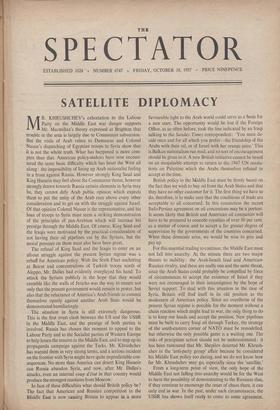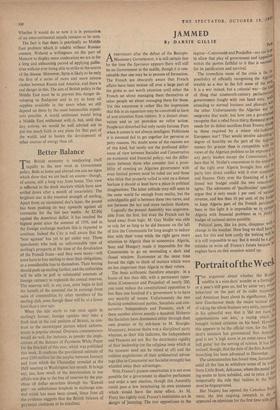SATELLITE DIPLOMACY
MR. KHRUSHCHEV's exhortation to the Labour Party on the Middle East war danger supports Mr. Macmillan's theory expressed at Brighton that trouble in the area is largely due to Communist subversion. But the visits of Arab rulers to Damascus and Colonel Nasser's dispatching of Egyptian troops to Syria show that it is not the whole truth. What has happened is more com- plex than that. American policy-makers have now encoun- tered the same basic difficulty which has beset the West all along : the impossibility of lining up Arab nationalist feeling in a front against Russia. However strongly King Saud and King Hussein may feel about the Communist threat, however strongly drawn towards Russia certain elements in Syria may be, they cannot defy Arab public opinion which expects them to put the unity of the Arab race above every other consideration and to get on with the struggle against Israel. Of that opinion Colonel Nasser is the representative, and his loan of troops to Syria must seem a striking demonstration of the principles of pan-Arabism which will increase his prestige through the Middle East. Of course, King Saud and the Iraqis were motivated by the practical consideration of not having their oil pipelines cut by the Syrians, but the moral pressure on them must also have been great.
The refusal of King Saud and the Iraqis to enter on an all-out struggle against the present Syrian regime was a rebuff for American policy. With the Sixth Fleet anchoring at Beirut and concentrations of Turkish troops north of Aleppo, Mr. Dulles had evidently overplayed his hand. To attack the Syrians publicly in the hope that they would crumble like the walls of Jericho was the way to ensure not only that the present government would remain in power, but also that the reluctance of America's Arab friends to commit themselves openly against another Arab State would be demonstrated humiliatingly.
The situation in Syria is still extremely dangerous. This is the first overt clash between the US and the USSR in the Middle East, and the prestige of both parties is involved. Russia has chosen this moment to appeal to the Labour Party and to the Socialist parties of Western Europe to help lessen the tension in the Middle East, and to step up its propaganda campaign against the Turks. Mr. Khrushchev has warped them in very strong terms, and a serious incident on the frontier with Syria might have quite unpredictable con- sequences. No more than America can desert King Hussein can Russia abandon Syria, and now, after Mr. Dulles's attacks, even an internal coup d'etat in that country would produce the strongest reactions from Moscow.
In face of these difficulties what should British policy be? The fact that American and Russian competition in the Middle East is now causing Britain to appear in a more favourable light to the Arab world could serve as a basis for a new start. The opportunity would be lost if the Foreign Office, as so often before, took the line indicated by an Iraqi talking to the Sunday Times correspondent : 'You must de- cide once and for all which you prefer—the friendship of the Arabs with their oil, or of Israel with her orange juice.' This is Balkan nationalism run mad, and no sort of encouragement should be given to it. A new British initiative cannot be based on an inequitable attempt to return to the 1947 UN resolu- tions on Palestine which the Arabs themselves refused to accept at the time.
British policy in the Middle East must be firmly based on the fact that we wish to buy oil from the Arab States and that they have no other customer for it. The first thing we have to do, therefore, is to make sure that the conditions of trade are acceptable to all concerned. In this connection the recent halo-Persian agreement on oil concessions may be a portent. It seems likely that British and American oil companies will have to be prepared to concede royalties of over 50 per cent. as a matter of course and to accept a far greater degree of supervision by the governments of the countries concerned. When these demands arise, we would be wise to grin and pay up.
For this essential trading to continue, the Middle East must not fall into anarchy. At the minute there are two major threats to stability : the Arab-Israeli feud and American- Russian rivalry, and these are really one and the same threat, since the Arab States could probably be compelled by fOrce of circumstances to accept the existence of Israel if they were not encouraged in their intransigence by the hope of Soviet support. To deal with this situation in the case of Syria, Britain will find itself in its old position as the moderator of American policy. Since no overthrow of the present Syrian regime is possible for the moment without a chain reaction which might lead to war, the only thing to do is to keep our heads and accept the position. New pipelines must be built to carry Iraqi oil through Turkey, the strategy of the south-eastern corner of NATO must be remodelled, but otherwise the only possible game is a waiting one. The risks of precipitate action should not be underestimated : it has been rumoured that Mr. Shepilov deserted Mr. Khrush- chev in the 'anti-party group' affair because he considered his Middle East policy too daring, and we do not know how far Mr. Khrushchev may go, especially since the 'satellite.'
From a long-term point of view, the only hope of the Middle East not falling into anarchy would be for the West to have the possibility of demonstrating to the Russians that, if they continue to encourage the onset of chaos there, it can only end in war. In the past, under such circumstances, the USSR has shown itself ready to come to some agreement.
Whether it would do so now it is in possession of an intercontinental missile remains to be seen.
The fact is that there is practically no Middle East problem which is soluble without Russian consent. Without a willingness on the part of Moscow to display some moderation we are in for a long and exhausting period of applying pallia- tives without ever being able to strike at the source of the disease. Moreover, Syria is likely to be only the first of a series of more and more intense clashes between Russia and America, and there is real danger in this. The aim of British policy in the Middle East must be to prevent this danger de- veloping to flashpoint and to try to keep oil supplies available in the years when we still depend on them by the most honourable expedi- ents possible. A world settlement would bring a Middle East settlement with it, but, until that day arrives, we would be well advised not to put too much faith in any plans for that part of the world, and to hasten the development of other sources of energy than oil.



































 Previous page
Previous page